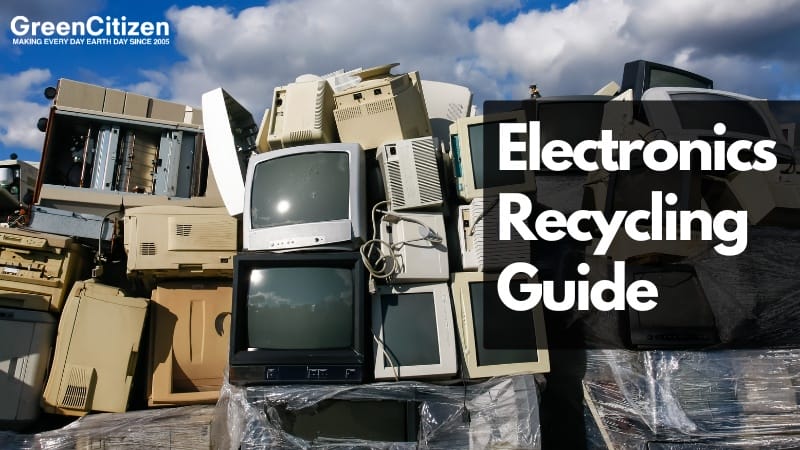Tossing electronics in the trash isn’t just lazy—it’s toxic, illegal, and wasteful.
Every year, millions of smartphones, laptops, TVs, and other electronics are tossed aside—often ending up in landfills where they leak toxic chemicals into the environment.
This growing pile of e-waste is one of the fastest-rising waste streams on Earth.
Yet despite the environmental risks, proper electronics recycling remains alarmingly low. Most people don’t know where to recycle old electronics, how the process works, or why it matters in the first place.
That’s why we created this complete guide to electronics recycling.
Whether you’re clearing out your garage or upgrading your office equipment, this guide will walk you through how to recycle electronics responsibly—what items are accepted, where to take them, and why recycling electronics protects both human health and the planet.
Key Takeaway: The Best Ways to Recycle Old Electronics
The best electronics recycling option is a certified e-waste recycler offering secure data destruction and traceable processing. Other options include manufacturer take-back programs, retail store drop-offs, municipal recycling centers, and donating working devices.
Choose a method that’s accessible, but always confirm it handles e-waste responsibly to avoid environmental harm.
What Is E-Waste?
E-waste, or electronic waste, refers to discarded electrical or electronic devices that are no longer wanted, working, or useful. These include items like computers, smartphones, televisions, and household appliances that run on electricity or batteries.
Many of these devices still contain usable materials—like copper, gold, and aluminum—as well as hazardous components such as lead, cadmium, and mercury. Whether broken, outdated, or simply replaced, any device with a plug or battery qualifies as e-waste once it’s discarded.
Think laptops, microwaves, game consoles, printers—even old chargers and power tools.
What Is Electronics Recycling?
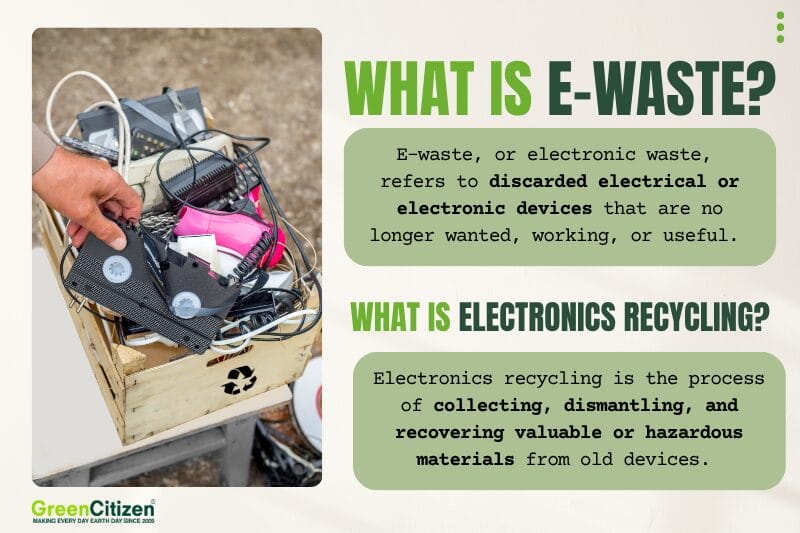
Electronics recycling is the process of collecting, dismantling, and recovering valuable or hazardous materials from old electronic devices. This helps reduce landfill waste, conserve natural resources, and prevent toxic chemicals from polluting the environment.
During the electronics recycling process, devices are sorted and disassembled. Recyclers recover metals like gold, silver, and copper, while safely handling toxic parts like batteries, circuit boards, and cathode ray tubes (CRTs).
Responsible e-waste recycling plays a crucial role in building a circular economy and reducing the environmental footprint of technology.
Can You Recycle All Electronics?
Most electronics can be recycled—but not all of them are accepted the same way.
Generally, any item with a battery, plug, or circuit board qualifies as recyclable e-waste. But depending on the type, size, and materials, some devices are recycled for free, while others may require a fee due to hazardous components or complex processing.
Below is a breakdown to help you understand what’s typically free and what might cost money to recycle.
Electronics Commonly Recycled for Free
These devices are widely accepted at e-waste drop-off centers and manufacturer take-back programs at no charge:
- Cell phones
- Laptops & computers
- Tablets & iPads
- LCD monitors & flat-screen TVs
- Servers
- Network switches
- Computer parts & accessories
Electronics That May Require a Recycling Fee
Some devices contain difficult-to-process parts, large plastic housings, or hazardous chemicals. These often come with a fee:
- Microwaves & kitchen appliances
- Vacuums, fans, and toasters
- CRT monitors and projector TVs
- Printers, fax machines & scanners
- DVD players, VCRs, and stereo systems
- Ink cartridges & toner
- Large appliances like refrigerators and washing machines
- Holiday lights and tangled cables
Pro Tip: Some retailers (like Staples or Best Buy) and electronics manufacturers offer free recycling programs, even for items that normally cost money to recycle.
5 Easy Electronics Recycling Options You Can Use Today
1. E-Waste Recycling Centers: The Gold Standard
You could toss your old electronics in the trash. But here’s what happens next: toxic chemicals leak into the soil, heavy metals contaminate water systems, and valuable materials are lost forever.
That’s why certified e-waste recycling centers exist—built to do what landfills and untrained recyclers simply can’t.
Why They’re the Best Option
E-waste recyclers don’t just “collect junk.” They safely dismantle electronics, recover precious materials, and handle hazardous waste like mercury, lithium, and lead without harming people or the planet.
They make sure your old laptop doesn’t end up poisoning groundwater in someone else’s backyard—or in a child’s hands at an unregulated overseas dump site.
Why Certification Matters
Not all recycling is responsible recycling.
Facilities certified by R2 or e-Stewards follow strict standards:
- They track every item from drop-off to final processing.
- They guarantee no illegal exports or environmental shortcuts.
- They’re audited regularly to ensure transparency and accountability.
Without these certifications, you’re trusting your electronics—and the toxins inside them—to just anyone. That’s a risk you don’t want to take.
Why It’s Also About You
Let’s not forget: your devices hold personal data.
Old hard drives, phones, and smart TVs can still contain sensitive information. Certified recyclers follow NIST 800-88 or DoD-compliant data destruction protocols to wipe them clean—far beyond a factory reset.
Bottom line: A certified e-waste recycling center protects your data, your health, and the planet. That’s not something a landfill—or a sketchy recycler—can promise. Accountability for your ESG goals.
2. Manufacturer Recycling Programs
When your device reaches the end of its life, don’t trash it—send it back to the company that made it.
Manufacturer take-back programs are among the most effective ways to recycle electronics responsibly, securely, and often for free.
Why Use a Manufacturer Recycling Program?
Electronics brands have the tools and incentives to recycle their products better than anyone. They know the materials, design, and disassembly process. That means higher recovery rates, safer handling of toxic components, and compliance with e-waste laws like Extended Producer Responsibility (EPR).
These programs also reduce landfill waste, support the circular economy, and help brands meet strict recycling regulations.
What Does a Manufacturer Take-Back Program Look Like?
Most offer:
- Mail-in recycling kits with prepaid shipping
- Retail drop-off bins in stores or partner locations
- Trade-in credits or rewards for recycling eligible items
Major manufacturers like Apple, Dell, HP, Lenovo, and Samsung have nationwide return programs that cover laptops, phones, printers, accessories, and more—even if they’re damaged or third-party.
Data Safety Still Matters
Just because you’re recycling through the manufacturer doesn’t mean your data is safe by default. Reputable programs often include certified data destruction, or at least provide guidance for factory-resetting before return.
Don’t Assume You’re Not Eligible
Many people throw away devices simply because they don’t realize the brand will take them back. Even outdated gear may qualify.
Just search “[Your Brand] electronics recycling program” and follow their return instructions.
3. Electronics Stores’ Recycling Programs
You don’t have to hunt down a specialty recycler—chances are, your local store already takes back electronics.
Major retailers like Best Buy, Staples, Lowe’s, and Home Depot have established in-store electronics recycling programs that are free, convenient, and often available year-round.
These programs are designed to make e-waste recycling easier for consumers who don’t want to deal with shipping, complex forms, or finding certified recyclers on their own.
How Retail Recycling Works
Most stores provide designated drop-off bins near their customer service desks. You bring in eligible devices—like laptops, monitors, cables, ink cartridges, or small kitchen appliances—and they’ll ensure proper recycling through certified partners.
Some retailers offer quantity limits, so it’s smart to check local rules before hauling in a garage full of gear.
What Can You Recycle at These Stores?
While policies vary, here’s a general idea:
- Best Buy: TVs, laptops, printers, cords, cameras, phones (fees apply for large items like TVs in some areas)
- Staples: Office electronics, accessories, ink/toner cartridges, and cables (mostly free, with limits)
- Lowe’s & Home Depot: Focus more on tools, batteries, and lighting (like rechargeable batteries and compact fluorescent bulbs
Why Use Retail Recycling?
- Accessibility: Most of these stores are in or near your neighborhood
- No shipping required: Just walk in and drop off
- Retail accountability: Many of these programs partner with certified e-waste recyclers
Plus, by offering these services, retailers meet corporate sustainability goals—which means they’re incentivized to handle e-waste responsibly.
Quick Tip: Always check your local store’s policy online. Some states have extra regulations or volume limits—and not every item is accepted at every location.
4. Municipal Waste Facilities
Your local government might be one of the easiest ways to recycle electronics—if you know when and where to go.
Many cities and counties operate municipal waste facilities that accept old electronics through dedicated e-waste recycling days or at permanent Household Hazardous Waste (HHW) drop-off locations.
These programs are designed to help residents safely dispose of items that can’t go in regular curbside bins—including electronics that contain toxic components like lead, mercury, and cadmium.
What Can You Recycle Through Municipal Programs?
Municipal recycling programs vary by region, but most accept common items like:
- TVs and monitors (including CRTs)
- Computers, tablets, and phones
- Microwaves and small appliances
- Batteries and cables
Larger or more complex items may require a fee or advance registration, especially during HHW collection events.
Why Household Hazardous Waste Matters
Electronics are often classified as household hazardous waste due to the dangerous materials they contain. Throwing them in the trash can lead to serious environmental damage—including soil contamination and water pollution.
That’s why local waste authorities group electronics with HHW items like paint, fluorescent bulbs, and cleaning chemicals—requiring special handling and regulated drop-off.
If your readers want to learn more, this is a perfect anchor for an internal link to your [Household Hazardous Waste guide].
What to Do
- Visit your city or county website and search “electronics recycling” or “HHW drop-off”
- Find out what’s accepted, when collection days are scheduled, and whether ID or residency proof is required
- Prepare items according to local guidelines (e.g., tape battery terminals, separate devices by type)
Pro Tip: Many municipal waste programs are funded by state e-waste laws, meaning recycling is often free—but not always year-round. Plan ahead to make the most of HHW days.
5. Donate Working Electronics
If it still works, don’t trash it—donate it.
Too many usable devices end up in landfills simply because they’re “last year’s model.” But for someone without access to tech, your old laptop, phone, or DVD player could be life-changing.
Donation is a powerful way to extend the life of your electronics while supporting education, job training, and low-income families.
Why Donation Makes Sense
- Keeps electronics out of landfills
- Supports digital inclusion and community programs
- Often more environmentally efficient than recycling
- Many donations are tax-deductible
What Can Be Donated?
Any working electronic device may be accepted, including:
- Smartphones and tablets
- Laptops and desktop computers
- TVs, DVD players, speakers
- Printers and monitors
- Small appliances in good condition
Always reset devices and remove personal data before donating.
Where to Donate Electronics
Here are trusted organizations that accept working electronics:
- Goodwill – nationwide drop-offs via the Dell Reconnect program
- Digitunity – matches donations with nonprofits in need
- PickupPlease – free home pickup for some electronics
- Freecycle – community-based donations near you
- eBay for Charity – sell your item and donate proceeds
Pro Tip: Search “[electronics donation near me]” to find local shelters, schools, or tech access nonprofits in your area.
Electronics Recycling in the San Francisco Bay Area with GreenCitizen
If you live in the San Francisco Bay Area, GreenCitizen makes electronics recycling easy, local, and completely transparent.
Since 2005, we’ve helped over 400,000 residents and 70,000 businesses responsibly recycle old electronics—keeping more than 32 million pounds of e-waste out of landfills.
Whether you’re dropping off a laptop at our Burlingame EcoCenter or scheduling a business pickup in San Jose or Oakland, we offer fast, certified e-waste recycling that fits into your day—not the other way around.
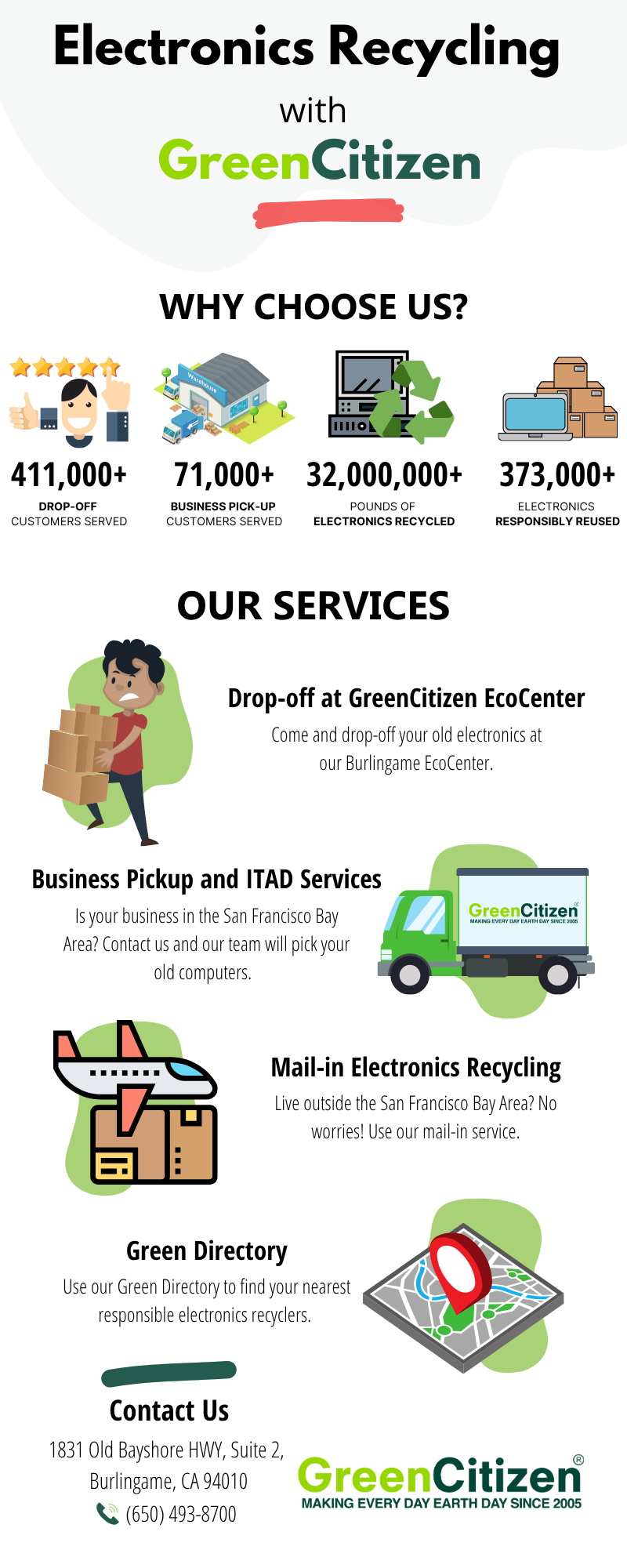
1. Drop-Off Electronics Recycling for the Bay Area Residents
If you live in the San Francisco Bay Area, you can bring your old electronics directly to GreenCitizen’s EcoCenter in Burlingame—no appointment needed.
We accept a wide range of devices, from laptops and monitors to phones, tablets, printers, and small appliances. Many items can be recycled for free, including computers, monitors, and smartphones. For fee-based items like TVs or microwaves, our team will let you know the cost before recycling—so there are no surprises.
When you arrive, our staff will help unload your items and process them on-site. You can pay for any fee-based items with a credit or debit card using our contactless readers.
Every device you drop off is tracked through our GreenCitizen Total Accountability Management System (GTAMS), which ensures your electronics are handled safely, ethically, and never exported overseas.
Visit us at:
1831 Bayshore Hwy, Suite 2, Burlingame, CA 94010
Call: (650) 493-8700
Whether you’re clearing out your home office or recycling old household gadgets, GreenCitizen makes electronics recycling easy, transparent, and local.
2. Business Electronics Recycling Pickup in the Bay Area
Running a business in the San Francisco Bay Area and need to responsibly dispose of outdated electronics? GreenCitizen offers fast, secure, and fully trackable e-waste pickups for companies of all sizes—whether you’re a startup clearing out old desktops or an enterprise decommissioning a full IT room.
We’ve helped over 70,000 Bay Area businesses meet their sustainability and ESG goals through our certified electronics recycling services.
All pickups are powered by our GreenCitizen Total Accountability Management System (GTAMS)—which tracks every item from pickup to processing, ensuring full transparency and 100% domestic recycling. Nothing we collect is ever exported or dumped overseas.
Here’s what your business can expect:
- Free pickup for qualifying loads
- DoD- and NIST-compliant data destruction for hard drives and sensitive equipment
- Detailed tracking reports for audits and compliance documentation
- Safe handling of computers, servers, monitors, cables, and networking equipment
Whether you’re upgrading your tech, clearing storage space, or responsibly managing IT asset disposal, GreenCitizen ensures your electronics are handled locally, ethically, and with complete traceability.
To request a quote or schedule a pickup, call (650) 493-8700 or contact our team for personalized support.
3. Mail-In Electronics Recycling (Available Nationwide)
No local recycling center nearby? No problem.
GreenCitizen offers a convenient mail-in electronics recycling service for individuals and businesses across the United States.
Whether you’re cleaning out your home office in rural Ohio or upgrading tech in a city without trusted e-waste programs, our nationwide mail-in option gives you a safe, certified way to recycle your devices.
Here’s how it works:
- Identify your devices and separate free vs. fee-based electronics (laptops, phones, printers, cables, etc.)
- Weigh your items and fill out our quick online Mail-In Recycling Form
- We’ll quote you the cost, including optional data destruction
- Ship the items to our Burlingame, California facility, and we handle the rest
Every item is tracked and processed through our GreenCitizen Total Accountability Management System (GTAMS)—just like our local pickups and drop-offs—so you know your devices are never exported or irresponsibly handled.
This is one of the easiest ways to recycle electronics from anywhere in the U.S., with full transparency and optional NIST/DoD-compliant data wiping.
4. Find Responsible Recyclers Using the Green Directory
Don’t know where to recycle your electronics locally? The Green Directory can help.
It’s a free tool from GreenCitizen that lets you search for certified electronics recyclers near you—wherever you are in the United States.
Just type in the item you want to recycle and enter your ZIP code. In seconds, you’ll get a curated list of nearby recycling centers that handle your specific device—whether it’s a laptop, TV, printer, or old phone charger.
Unlike generic search results, the Green Directory only shows responsible, verified recyclers. That means:
- No landfill dumping
- No shady exports to developing countries
- No guessing if your items are being processed ethically
It’s one of the easiest ways to find legit e-waste recycling options near you, especially if you’re outside of our direct service area.
Use it to locate drop-off points, certified take-back programs, and local HHW centers that accept electronics—and recycle with confidence.
Why Some Electronics Cost Money to Recycle
If you’ve ever wondered why you sometimes have to pay to recycle old electronics, the answer comes down to materials and processing costs.
While some devices—like laptops and smartphones—contain valuable metals such as gold, silver, and copper, most electronics aren’t worth much once they’re dismantled. In fact, many contain toxic materials like mercury, lead, and brominated flame retardants that require special handling and expensive disposal methods.
That’s why responsible recyclers—like GreenCitizen—charge small fees for items like CRT monitors, microwaves, or older appliances. It helps cover the cost of processing hazardous components safely, without cutting corners or exporting waste overseas.
In some countries, like Ireland, the cost of recycling is built into the purchase price of electronics through legislation. That means recycling is “free” at the point of drop-off—but consumers paid for it upfront.
In the U.S., most states don’t have these extended producer responsibility (EPR) laws, so recycling fees are handled directly by the consumer.
Paying a small fee today helps prevent toxic e-waste from harming people, soil, and water tomorrow.
Why Responsible Electronics Recycling Matters More Than Ever
E-waste isn’t just another trash problem. It’s a growing environmental, health, and ethical crisis that impacts everyone—from groundwater in the U.S. to the air children breathe in Ghana.
Here’s why recycling electronics the right way truly matters:
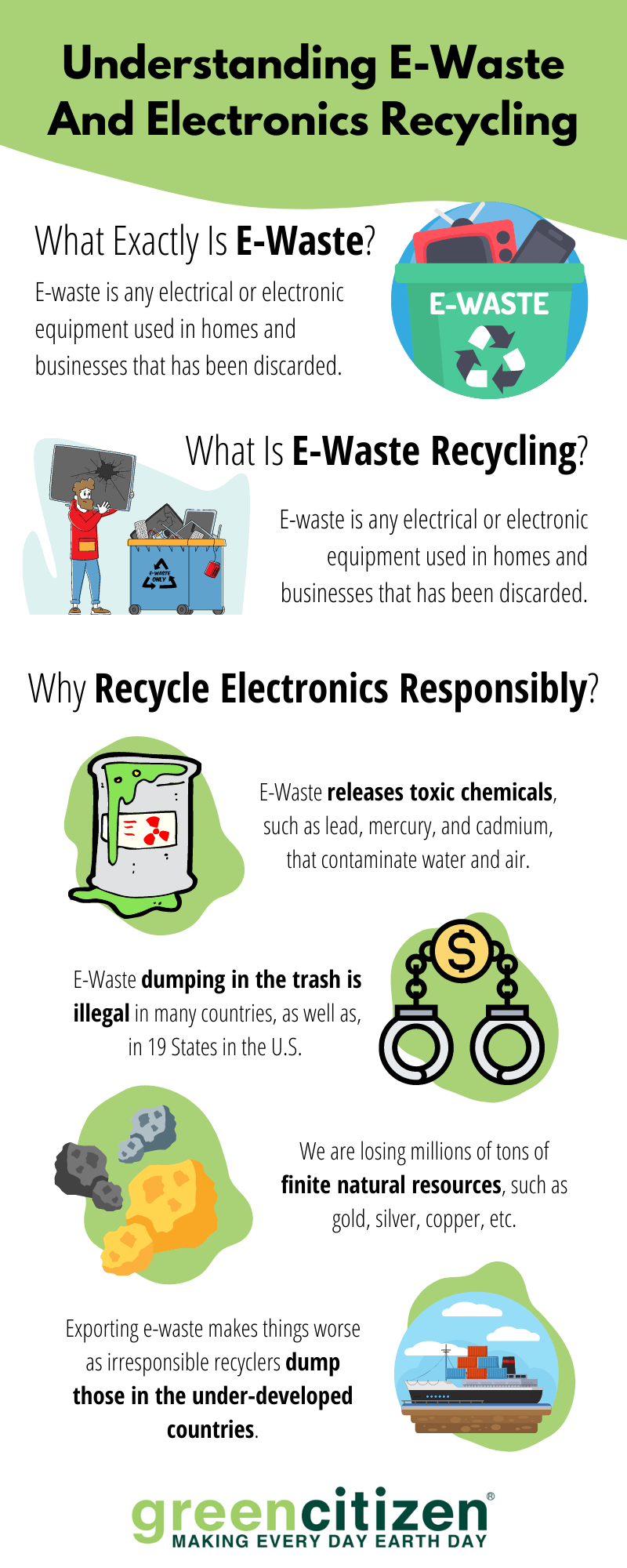
1. E-Waste Is Loaded with Toxic Substances
Many electronic devices contain:
- Lead: Damages nervous systems and is especially harmful to children
- Mercury: Contaminates soil and waterways, affecting fish and human health
- Cadmium and flame retardants: Known carcinogens and respiratory hazards
When e-waste ends up in landfills, these substances leach into the soil and groundwater, or are released as airborne toxins during informal burning.
In the U.S. alone, the EPA estimates that over 2.7 million tons of electronics enter the waste stream every year—much of it improperly discarded.
2. Irresponsible Disposal Is Often Illegal—But Widely Ignored
As of 2024, 25 U.S. states have e-waste legislation in place, and 19 explicitly ban electronics from being landfilled. However, enforcement is limited, and consumer awareness remains low.
Without adequate education and recycling infrastructure, devices often end up in the trash, violating laws and undermining local waste systems.
19 U.S. States Where E-Waste Dumping Is Illegal
- Arkansas
- California
- Colorado
- Connecticut
- Illinois
- Indiana
- Maine
- Massachusetts
- Minnesota
- New Hampshire
- New Jersey
- New York
- North Carolina
- Oregon
- Pennsylvania
- Rhode Island
- South Carolina
- Vermont
- Wisconsin
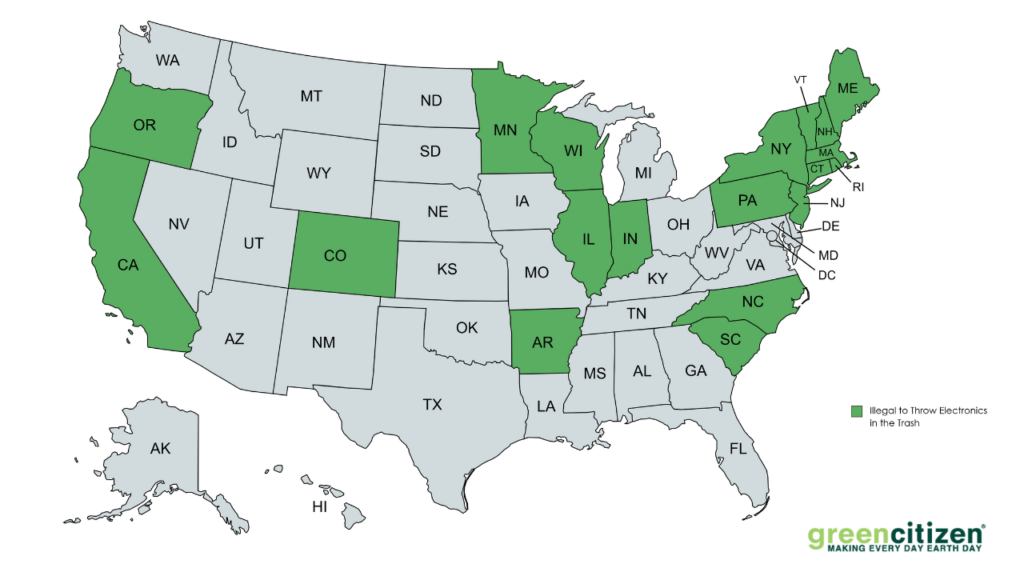
3. We're Losing Critical Resources That Can Be Recovered
Electronics are one of the richest sources of precious and rare earth metals:
- A ton of e-waste contains more gold than a ton of mined ore
- Metals like cobalt, palladium, lithium, and nickel are essential for renewable energy, EVs, and modern tech
Mining these materials is energy-intensive and environmentally destructive—contributing to deforestation, toxic runoff, and carbon emissions. Recycling, on the other hand, uses up to 90% less energy and supports the circular economy by feeding materials back into production.
4. Exporting E-Waste Creates Environmental Injustice
An estimated 50 million metric tons of e-waste are generated globally each year—much of it exported to developing countries under the guise of recycling. In places like Agbogbloshie (Ghana) and Guiyu (China), discarded electronics are stripped, burned, or acid-bathed in open-air yards.
This informal “processing” releases toxic fumes, pollutes water, and causes chronic illness among workers—many of them children.
Even when U.S. consumers think they’re recycling, some uncertified recyclers still export e-waste to avoid domestic processing costs.
Choosing responsible recycling—through certified facilities and verified programs—is the only way to ensure your devices don’t cause long-term harm after they leave your hands.
Frequently Asked Questions (FAQ)
You can get rid of used electronics by contacting the manufacturer or the store you bought them from. Many companies offer a free recycling drop-off point, and every major city usually has these options.
Best Buy accepts products for electronics recycling when you return something you bought there or when buying something new. They don’t process the electronics themselves but use reputable services to handle the waste.
You can recycle used electronics at major electronics stores, manufacturers’ drop-off points, municipal waste facilities, and electronics recycling businesses. Every major city should provide enough options.
Yes, Goodwill accepts certain electronics. But it’s best to contact them to see what they currently accept and where in your city you can bring them.
Yes, Goodwill may accept TVs as long as they are modern flat screen types and working. Older CRT ones end up costing them money if they can’t find a home for them.
If you have any old TVs that still work, then the best thing to do is give them away to someone you know or donate it. As long as it’s a flat-screen TV, you’ll find that it’s easy enough to make sure that it finds a home.
No, you shouldn’t put an electronic device in the recycle bin. Electronics require special techniques and processes that wouldn’t be available at regular recyclable household trash processing facilities.
It’s hard to recycle electronics because many of them contain toxic materials. While a typical electronic device has some precious and base metals, it likely also has things like mercury and cadmium.
Recycle Smarter. Protect More Than Just Your Devices.
Electronic waste is one of the fastest-growing environmental challenges of our time—but it’s also one of the most solvable. Whether you’re dealing with an old laptop, broken microwave, or outdated phone charger, there’s a right way to recycle—and it’s easier than ever.
From certified drop-off centers in the San Francisco Bay Area to nationwide mail-in recycling and tools like the Green Directory, GreenCitizen is here to help you make the sustainable choice with confidence.
You’re not just getting rid of clutter. You’re protecting the planet, supporting a circular economy, and setting a new standard for how we treat technology at the end of its life.
Explore your options. Ask questions. And when in doubt—recycle responsibly.

